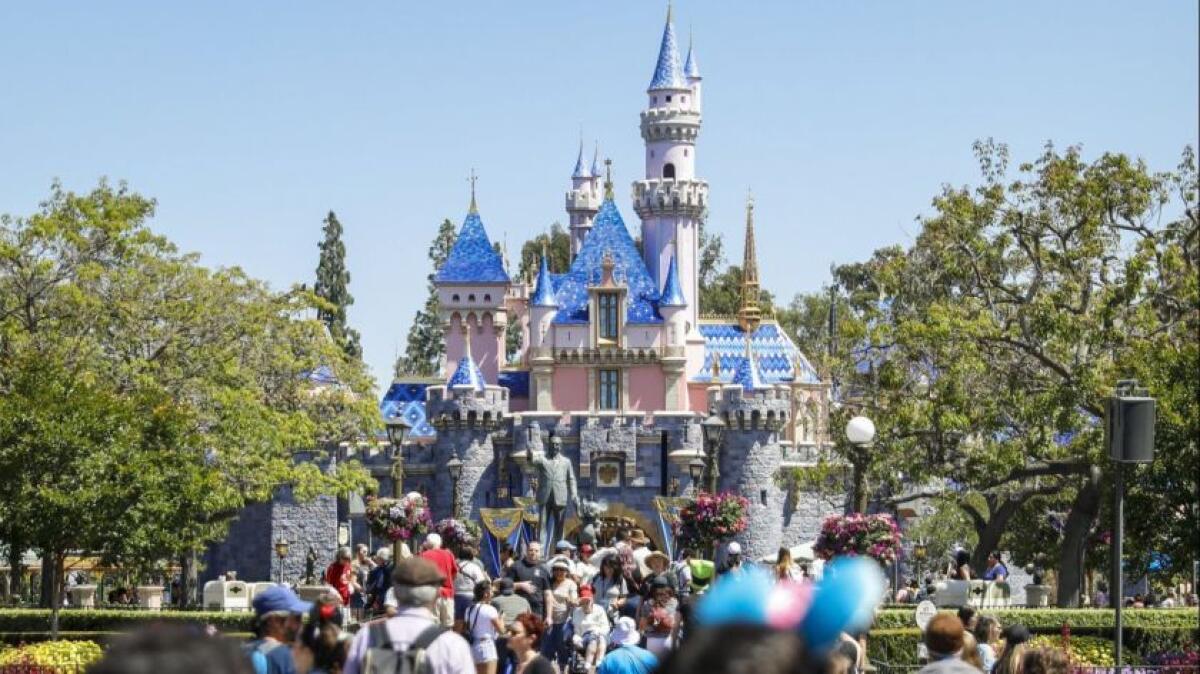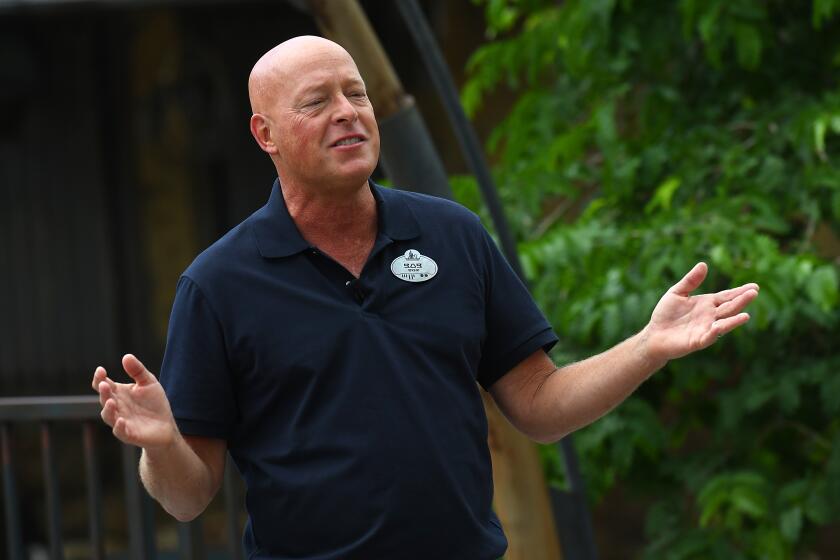Disney+ subscriber growth less than expected. Is the pandemic-fueled streaming boom slowing down?

Disney+ added fewer subscribers than expected in the most recent fiscal quarter, the latest sign that the pandemic-driven boom in streaming may be starting to wane.
All eyes are on Disney’s streaming numbers, which have emerged as the company’s top priority. Disney+ hit 103.6 million subscribers worldwide in its second quarter, up from the 100 million it announced in March. But that was lower than the 109 million predicted by analysts on FactSet.
Walt Disney Co. shares fell 4% in after-hours trading on Wall Street, after closing up 49 cents, or 0.3%, to $178.34.
The disclosure comes after Netflix in April reported adding a disappointing 4 million global subscribers in the most recent quarter. Netflix said its paid membership growth slowed because of the “big COVID-19 pull forward in 2020” and a lighter content slate due to production delays.
It remains to be seen whether the slower-than-expected growth is a momentary blip or an indicator of a long-term trend.
Disney executives were upbeat about the numbers when speaking to analysts after second-quarter earnings. Disney+ added 8.7 million subscribers to the 94.9 million it had at the end of the first quarter. Chief Financial Officer Christine McCarthy said the growth came despite Disney+ not launching in any major new markets. The app also raised prices, including a $1-a-month boost in the U.S.
Chief Executive Bob Chapek reiterated that Disney+ is expected to hit 230 million to 260 million subscribers in 2024. The price increase did not drive any noticeable increase in churn, or people leaving the service, Chapek said. “We seem to be fairly resilient to those price increases,” he said.
Stay-at-home orders drove an influx of subscribers to streaming services at the beginning of the COVID-19 pandemic, with movie theaters and other out-of-home entertainment options largely closed. The streaming landscape has become increasingly crowded with competitors, including HBO Max, Peacock and Paramount+.
Disney has continued to introduce attention-grabbing shows to the subscription platform, including Marvel’s “The Falcon and the Winter Soldier,” adding to a list of hits such as “WandaVision” and “The Mandalorian.” Marvel will release its next big offering, “Loki,” on the service in June.
The Wide Shot is your local lens on Hollywood
Our new weekly newsletter delivers insights, analysis and exclusive coverage of the entertainment industry from The Times’ Company Town team.
You may occasionally receive promotional content from the Los Angeles Times.
Disney-owned Hulu, which has non-Disney-branded content including shows from FX and movies from Searchlight Pictures (both owned by Disney), had 41.6 million subscribers during the quarter, which ended April 3. The more adult-oriented Hulu served as the streaming home of Searchlight’s “Nomadland,” which won the Oscar for best picture in April.
Including 13.8 million subscriptions for ESPN+, the company’s total streaming subscriber count hit 159 million, slightly below the 162 million analysts expected.
Disney reported second-quarter net income of $912 million, nearly double the profit from the same time last year. Its adjusted earnings of 79 cents a share significantly beat analyst expectations of 26 cents a share. Revenue fell 13% to $15.61 billion, missing Wall Street estimates of $15.86 billion.
The earnings strength was attributed to better-than-expected results in cable and broadcasting and direct-to-consumer businesses.
Cable and broadcasting profits benefited from a decrease in programming and production costs along with higher revenue from broadcasting affiliates. Operating income at the segment grew 15%, to $2.85 billion.
Walt Disney Co.’s shareholder meeting took place almost a year after the coronavirus outbreak forced the closure of theme parks and theaters.
Streaming lost less money than expected, reflecting improved results at Hulu. Direct-to-consumer revenues for the quarter increased 59% to $4 billion, while operating losses decreased to $290 million from $805 million.
The company’s revival will depend heavily on the return of its theme parks. Disneyland opened at the end of last month, with restrictions, in a major milestone for the company as Disney tries to put the devastating public health crisis behind it.
The Anaheim resort finally began welcoming guests through its gates with attendance capped at 25% of capacity. Guests and employees must wear masks, and people who don’t live together must maintain physical distance in queues and on rides. Parades and fireworks shows have been scrapped, and costumed characters such as Mickey Mouse and Goofy aren’t giving out hugs, though they can pose for pictures.
Revenues from parks, experiences and products declined 44% year over year to $3.17 billion, while the segment swung to a loss of $406 million, compared with a profit of $756 million a year earlier, because of closures.
Disney went a year without opening its biggest movies in theaters and selling tickets for Disneyland. During that time, the clear focus of the Burbank entertainment giant became its streaming services, Disney+, Hulu and ESPN+.
With the California parks finally open and blockbusters such as “Black Widow” on the way, Disney investors may soon see what the company looks like when all its businesses are able to function as the pandemic inches toward its end.
Even as movie theaters reopen across the country, Disney isn’t putting all its chips on that market. Instead, it’s putting big-budget movies such as “Cruella,” starring Emma Stone, and “Black Widow,” featuring Scarlett Johansson, simultaneously in theaters and on Disney+ for a $30 fee on top of its $7.99 monthly subscription cost. Pixar’s “Luca” will go straight to the service for no additional charge.
However, Disney’s Chapek said the company will give theaters a 45-day exclusive window for the upcoming 20th Century Studios movie “Free Guy” and Marvel’s “Shang-Chi and the Legend of the Ten Rings.”
Disney on Thursday also said that its comedy adventure “Jungle Cruise,” starring Dwayne Johnson, will hit Disney+ for $30 through its Premier Access strategy, suggesting that the company is keeping its options open as it decides how to release new movies.
Chapek said Premier Access gives Disney “the ability to go ahead and try to release things into the market and try to re-prime the pump” while still giving leery viewers the option to watch “in the safety and convenience of their home.”
More to Read
Inside the business of entertainment
The Wide Shot brings you news, analysis and insights on everything from streaming wars to production — and what it all means for the future.
You may occasionally receive promotional content from the Los Angeles Times.












